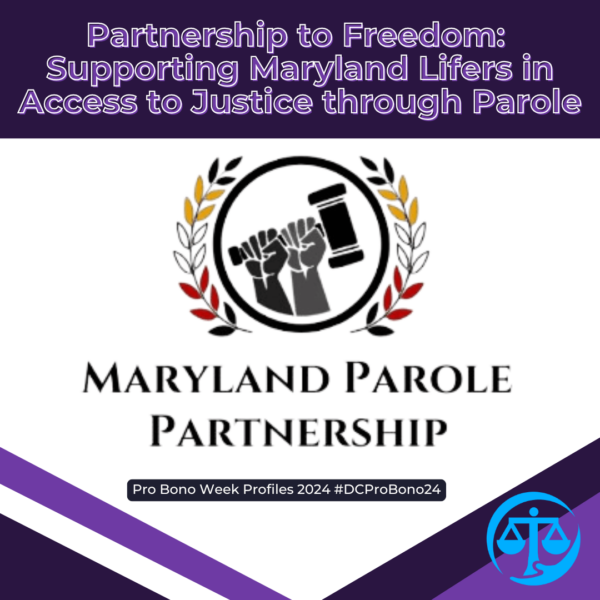
DC Pro Bono Week Profiles: Partnership to Freedom: Supporting Maryland Lifers in Access to Justice through Parole
By Gwen Washington
The Prison Policy Initiative[1] projects that Maryland incarcerates 475 persons per every 100,000 people in the state. Maryland’s exceptionally high rate of incarceration stands out on an international scale, outpacing several NATO-member nations. See id. As the State’s Attorney General recently acknowledged, Maryland’s prisons are among the worst in the nation for their racially disparate incarceration of Black people. The disparities are particularly extreme among the more than 2,000 people serving life-with-parole sentences: about 77% of Maryland lifers are Black, in a state that is about 31% Black. For those who were children at the time they were first incarcerated, the numbers are even more stark – 84%.[2]
In 1995, the Maryland state legislature functionally abolished its parole system for people serving paroleable life sentences, when then-Governor Parris N. Glendenning announced he would not grant parole to any lifer. For the next quarter of a century, other Governors followed suit, and no Maryland lifer would be granted parole absent a grant of executive clemency. After a series of United States Supreme Court decisions established that most life without parole sentences for juvenile defendants violated the Eighth Amendment’s prohibition against cruel and unusual punishment,[3] Maryland lifers sued to ensure a meaningful opportunity for release, eventually leading to certain reforms. In 2022, following decades of advocacy by lifers and their families, the Maryland state legislature passed measures to leave parole to the discretion of the Maryland Parole Commission, removing Maryland’s governor from the parole process in most cases.
However, despite multiple judicial and legislative measures to make parole available, the parole process still presents a daunting process for those serving life sentences as they attempt to access justice in Maryland’s extraordinarily complex parole process.
Enter the ACLU Maryland Parole Partnership.
The ACLU Maryland Parole Partnership (ACLU MPP), spearheaded by the ACLU of Maryland, was formed to help Maryland lifers access justice in Maryland’s parole process. It is the culmination of the life’s work of numerous people serving life sentences, particularly the “Lifers Groups” that have organized for decades behind prison walls along with the family members who have supported them. The ACLU MPP evolved from the Juvenile Lifer Parole Representation Project, a collaboration of several organizations and law school clinical teaching programs from Maryland and DC assisting lifers sent to prison as children in accessing justice.
During the COVID-19 public health crisis, the ACLU of Maryland and a team from Cleary Gottlieb partnered with former lifers from Maryland’s prison system, Calvin McNeill, Nathaniel Foster, and Earon Timmons, to update and expand on earlier efforts. They have worked together, with pro bono attorneys, to expand access to justice for Maryland prisoners seeking parole. To date, more than 50 people have rejoined their families after receiving assistance from MPP.
Nearly all of ACLU MPP’s clients were sentenced to life while in their late teens and early twenties. These lifers showed tremendous trust and faith in their attorneys to guide them through Maryland’s complex parole system and, in turn, taught these ACLU MPP volunteer attorneys the meaning of fortitude and hope. While serving an average of three to four decades behind bars, these lifers have worked diligently, not only to rehabilitate their lives, but to improve the lives of those around them. These clients graciously imparted their creed to the ACLU MPP pro bono volunteers, encouraging volunteers not to give up their fight when setbacks, bureaucratic delays and a myriad of other difficulties posed obstacles to their pursuit of justice.
The lifers’ creed is this: Never Give In, Never Give Up.
The ACLU MPP has achieved great success helping their clients obtain justice, winning their parole grants from the Maryland Parole Commission. However, there are still scores of prisoners serving life sentences who desperately require the assistance of a pro bono attorney as they attempt to access justice. Thus, the ACLU MPP remains steadfast in its valiant efforts to ensure fairness and due process for Maryland’s lifers.
There are many opportunities for pro bono attorneys to work with the ACLU MPP as this tremendous project moves forward with helping those in need and their families to access justice.
To volunteer in the ACLU MPP, please contact Anthony Muhammad at muhuammad@aclu-md.org or Sonia Kumar at kumar@aclu-maryland.org.
[1] Prison Policy Initiative, Maryland Profile, as of September 20, 2024.
[2] Maryland Restorative Justice Initiative and ACLU of Maryland, Still Blocking the Exit at 9, https://www.aclu-md.org/sites/default/files/field_documents/stillblockingtheexit_final.pdf.
[3] Graham v. Florida, 560 U.S. 48 (2010), Miller v. Alabama, 132 S.Ct. 2455 (2012), Montgomery v. Louisiana, 136 S. Ct. 718 (2016).
Gwen Washington is a Pro Bono Attorney at Cleary Gottlieb and a board member for Washington Council of Lawyers.






